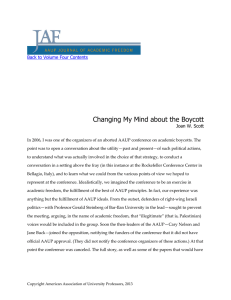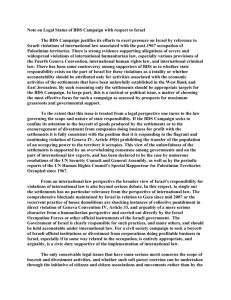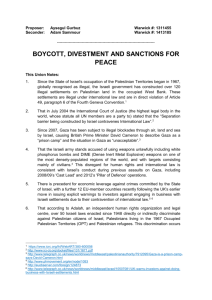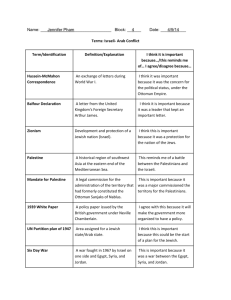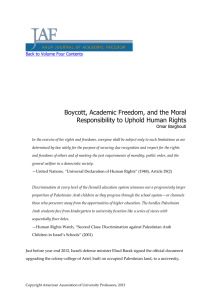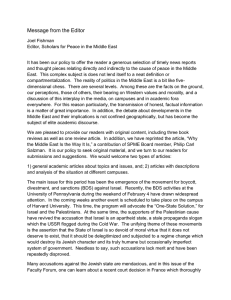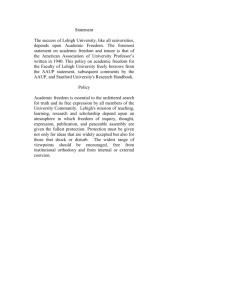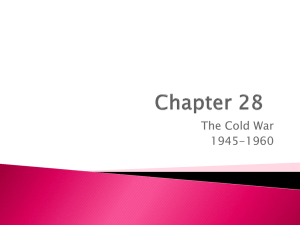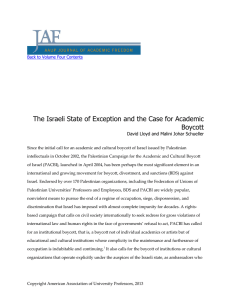Palestine, Boycott, and Academic Freedom: A Reassessment Introduction Bill V. Mullen
advertisement
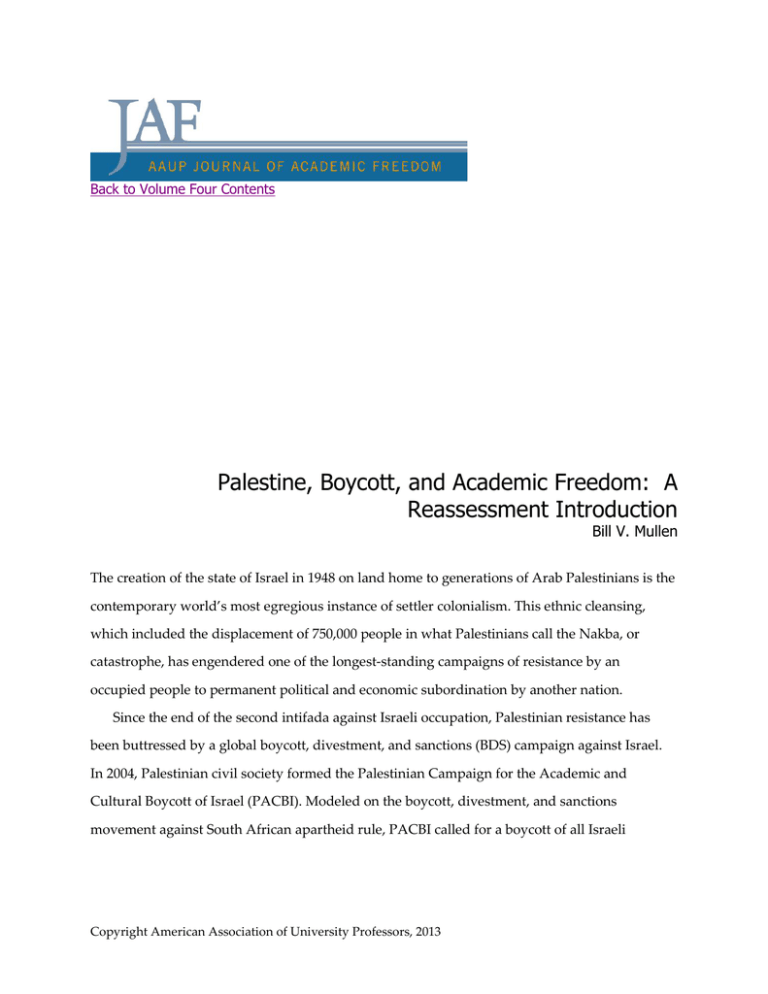
Back to Volume Four Contents Palestine, Boycott, and Academic Freedom: A Reassessment Introduction Bill V. Mullen The creation of the state of Israel in 1948 on land home to generations of Arab Palestinians is the contemporary world’s most egregious instance of settler colonialism. This ethnic cleansing, which included the displacement of 750,000 people in what Palestinians call the Nakba, or catastrophe, has engendered one of the longest-standing campaigns of resistance by an occupied people to permanent political and economic subordination by another nation. Since the end of the second intifada against Israeli occupation, Palestinian resistance has been buttressed by a global boycott, divestment, and sanctions (BDS) campaign against Israel. In 2004, Palestinian civil society formed the Palestinian Campaign for the Academic and Cultural Boycott of Israel (PACBI). Modeled on the boycott, divestment, and sanctions movement against South African apartheid rule, PACBI called for a boycott of all Israeli Copyright American Association of University Professors, 2013 AAUP Journal of Academic Freedom Volume Four 2 academic and cultural institutions. In its founding statement, PACBI asserted that Israeli universities had been explicit or implicit supporters of three aspects of the Israeli occupation of Palestine: Denial of its responsibility for the Nakba—in particular the waves of ethnic cleansing and dispossession that created the Palestinian refugee problem—and therefore refusal to accept the inalienable rights of the refugees and displaced stipulated in and protected by international law; Military occupation and colonization of the West Bank (including East Jerusalem) and Gaza since 1967, in violation of international law and UN resolutions; The entrenched system of racial discrimination and segregation against the Palestinian citizens of Israel, which resembles the defunct apartheid system in South Africa.1 From its inception, the BDS campaign has grown internationally, compelled by events in Palestine. In 2009, for example, in response to Israel’s December 2008–January 2009 “Operation Cast Lead” bombing campaign in Gaza, which killed more than 1,400 Palestinians, US citizens launched the US Campaign for the Academic and Cultural Boycott of Israel (USACBI). The USACBI modeled its call for boycott directly on those of PACBI, supplemented with this statement on academic freedom: “We believe it is time to take a public, principled stance in support of equality, self-determination, human rights (including the right to education), and true democracy, especially in light of the censorship and silencing of the Palestine question in US universities, as well as US society at large. There can be no academic freedom in Israel/Palestine unless all academics are free and all students are free to pursue their academic desires.”2 To date, USACBI has gathered signatures from more than one thousand academics and cultural workers worldwide. The AAUP has to date opposed the BDS campaign against Israel. Its opposition has been grounded in the argument that academic boycotts curtail academic freedom. In the spring of 2005, in response to the British Association of University Teachers’ announced boycott of two Israeli universities, the Association’s Committee A on Academic Freedom and Tenure approved 3 Palestine, Boycott, and Academic Freedom Bill V. Mullen a statement declaring the Association’s commitment to “advancing the free exchange of ideas among academics irrespective of governmental policies and however unpalatable those policies may be viewed. We reject proposals that curtail the freedom of teachers and researchers to engage in work with academic colleagues, and we reaffirm the paramount importance of the freest possible international movement of scholars and ideas.”3 An AAUP subcommittee subsequently issued a report proclaiming that “academic boycotts . . . strike directly at the free exchange of ideas even as they are aimed at university administrations or, in the case of the AUT call for a boycott of Israeli universities, political parties in power.” The AAUP argued that “colleges and universities should be what they purport to be: institutions committed to the search for truth and its free expression. . . . The need is always for more academic freedom, not less.”4 In the fall of 2006, the AAUP dedicated a special issue of its journal Academe to the question of academic boycotts (the history of that special issue and a conference originally planned on the topic is recounted elsewhere in this issue by Joan Scott). The Academe special issue provided a venue for formalized reflection on both the support for and debate around the PACBI campaign against Israel and its South African predecessor. It included the AAUP report rejecting an academic boycott of Israel cited above and essays critical of the AAUP position by BDS cofounders Omar Barghouti and Lisa Taraki, Birzeit University professor Remma Hemmame, UCLA professor Sondra Hale, and London School of Economics professor Hilary Rose. It also included three essays on the South African BDS movement, and a “Reflections” essay by Ernst Benjamin reiterating the AAUP’s opposition to academic boycotts.5 This issue of the Journal of Academic Freedom provides an important and necessary opportunity to reassess the AAUP’s opposition to BDS in light of Israel’s increasing and sustained repression of and violence against Palestinians since 2005, and a corollary increase in international support for the BDS campaign. More germane, it provides a venue for sustained attention to the meaning of “academic freedom” in the context of the BDS campaign against Israeli occupation. To that end, this print roundtable brings together five scholars who AAUP Journal of Academic Freedom Volume Four 4 challenge the AAUP’s invocation of academic freedom to oppose the boycott. The essays explore three particular dimensions of its position: first, conceptual weaknesses; second, the tacit granting of “exceptional” status to Israel in light of the Association’s prior support of censure and economic boycott of South Africa; and third, the way invocations of academic freedom in Arab universities in the Middle East with US sponsorship help advance US and Israeli interests in maintaining settler-colonial rule in Occupied Palestine. If there is a single unifying theme to the essays, it may be the pithy formulation by BDS supporters David Lloyd and Malini Schueller: “If there has been anywhere a systematic denial of academic freedom to a whole population, rather than to specific individuals or to institutions, it is surely in Palestine under Israeli occupation.” The dossier begins with PACBI cofounder Omar Barghouti’s rearticulation of conceptual and ethical challenges to the AAUP’s opposition to the boycott and understanding of academic freedom, especially against events in higher education in occupied Palestine since 2005. Barghouti argues that the AAUP’s refusal to support BDS on grounds of academic freedom contravenes UN resolutions on human rights which assert that “academic freedom includes the liberty of individuals to express freely opinions about the institution or system in which they work, to fulfill their functions without discrimination or fear of repression by the state or any other actor,” conditions he argues are unattainable for Palestinian academics working under occupation. Barghouti also argues that academic freedom cannot be a “privileged” freedom in the context of an occupation that has widely dismantled civil liberties of all sorts. Along similar lines, Lloyd, a founding member of the USACBI campaign, and Schueller, a signatory to it, argue that the occupation itself is the single greatest hindrance to academic freedom for Palestinians, and that academic freedom is a subset of political freedom. They contend that the AAUP, by refusing to support of the boycott, grants Israel a “state of exception” that legitimates its crimes against both Palestinian academics and the larger civilian population. Mayssoun Soukarieh and Sami Hermez broaden the conceptual framework for thinking through the relationship between the occupation and BDS, examining how US-supported universities in the 5 Palestine, Boycott, and Academic Freedom Bill V. Mullen Arab world deploy academic freedom to constrain local struggles against Israel. They point out how these universities and administrators can use claims of academic freedom to shut down campus criticism of Israeli state policies, and to promote US political and economic interests in the Middle East. In tandem, these contributors show that academic freedom is a tool often used by Israel and its supporters to deny basic Palestinian rights, or to legitimate academic work that participates in the oppression of Palestinian citizens. They challenge the casual fetishization of academic freedom as part of a liberal hegemony that provides ideological cover for brutal acts of intellectual and political terror by Israel—with US support—against an occupied people. With political outrage borne out by rigorous analysis, the essays urge the AAUP to rethink its opposition to the boycott, while offering new arguments for advancing international resistance to the effects of the occupation on Palestinian life and academic work. Bill V. Mullen is Professor of English and American studies at Purdue University. He is a member of the USACBI Advisory Board. He has recently published the essay “Building the Palestinian International” in the Social Text online Periscope dossier, available at http://www.socialtextjournal.org/periscope/2012/07/mullen.php. Notes PACBI, “Call for Academic and Cultural Boycott of Israel,” July 6, 2004, http://pacbi.org/etemplate.php?id=869. 2 USACBI, “Mission Statement,” 2013, http://www.usacbi.org/mission-statement/. 3 Committee A on Academic Freedom and Tenure, quoted in AAUP, “On Academic Boycotts,” Academe 92 (September–October 2006): 39. 4 AAUP, “On Academic Boycotts,” Academe 92 (September–October 2006): 41–42. 5 Ernst Benjamin, “Reflections on Academic Boycotts,” Academe 92 (September–October 2006): 80–83. 1
